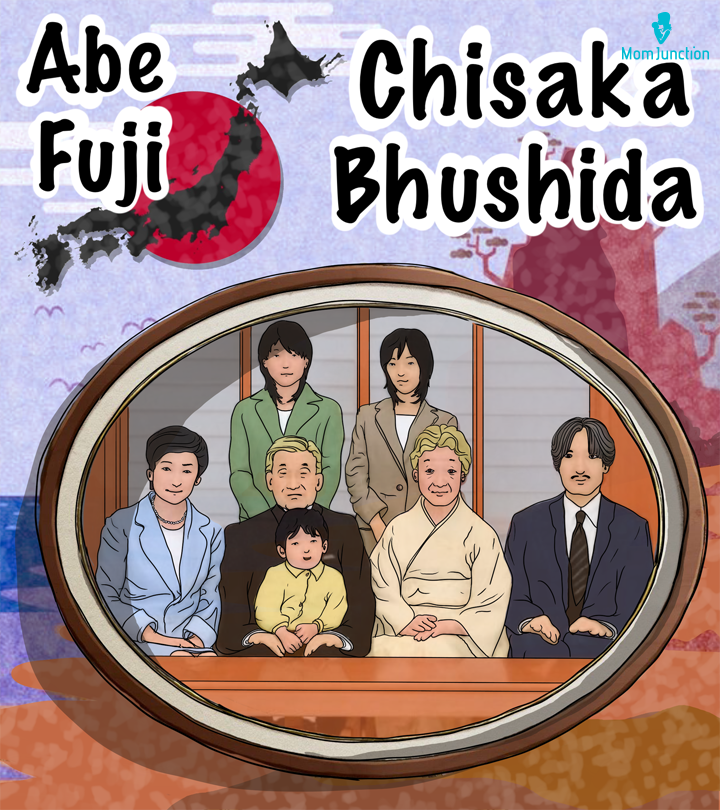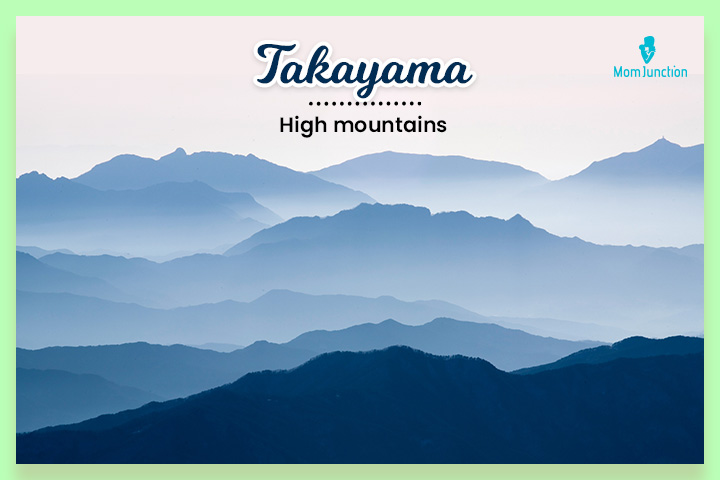Japan is one of the most densely populated and urbanized countries. The mountainous country is known for its rich culture and sophisticated technology. If you are looking for Japanese last names for your baby, this post is for you. The Japanese share a close bond with nature and their ancestors. Hence, most of their last names derive from nature, such as forest, mountain, sea, and ancient clan names. In this post, we bring you some Japanese surnames with their meanings.
Japanese Last Names Or Surnames With Meanings
1. Abe
In Japanese, the letter A means ‘peace’ and be means ‘multiple times’. One of the oldest Japanese clans is known by this name. The most famous bearer of this surname is Shinzō Abe, the Prime Minister of Japan.
2. Abiko
A means peaceful, Bi means grandchild, and Ko means child. Mitsuhiro Abiko (Japanese sprinter) and Tomomi Abiko (pole vaulter) are its famous bearers.
3. Aburaya
Aburaya comprises Abura, which means ‘made with Abura (oil),’ and Ya means ‘valley.’
4. Adachi
This name is variously written, but the kanji characters used mean ‘foot’ or ‘stand’. The Adachi clan was a samurai family. Some of the important name bearers are Japanese actors Osamu Adachi and Yumi Adachi.
5. Adachihara
In this name, Ah means ‘leg’, ‘limp’, ‘step’, Dachi means ‘stand’, and Hara means ‘plain’. Kenji Adachihara is a renowned football player.
6. Agawa
In Japanese, A means ‘nook’, ‘flatter’, ‘corner’ and Kawa means ‘stream’, ‘river’. Some of the notable name bearers are Hiroyuki Agawa (Japanese writer) Sawako Agawa (Japanese writer and television personality).
7. Aguni
A or Awa refers to foxtail millet, and Guni means ‘country’.
8. Ahane
The kanji character Ah means ‘second’, ‘Asia’, Ha means ‘wave’ and Ne means ‘root’. Singer and songwriter Ayano Ahane is a notable person.
9. Aikawa
Ai means ‘sympathize’ and Kawas means ‘river’. This name is generally added as a middle name or as a last name.
10. Aoki
This surname means ‘green tree,’ and is mostly found in central Japan and the Ryukyu Islands. The bearers of this surname have connections with the Takeda branch of the Minamoto clan and Fujiwara. Takeda is a respected family name in Japan, which is one of the reasons why blogger Chinese-Indonesian blogger, Hoei Ching-ling chose to adopt it as her Japanese surname. She says, “Shakespeare’s ‘What’s in a name?’ really plays a lot here. And for my specific case, the ‘what’ question will give tons of info about how and why I chose my Japanese surname of ‘Takeda’ (武田). For me, it’s not only about the meaning, but it’s also about fondness and respect… I chose the surname ‘Takeda’ not just merely because of that it’s the name of a samurai domain in Aizu (present-day Fukushima), which this mode implicitly means ‘to be sound great in Japanese’. According to my Japanese history professor, the surname ‘Takeda’, which means, ‘battlefield’ really indicates the noble spirit of a warrior for those holding the surname. But when I choose this surname, this option is really based on my amazement and fondness over Aiki-budo and Takeda Sokaku (1859-1943), the disseminator of the art (i).”
11. Aiuchi
Ai means ‘love’ and Uchi means ‘inside’. Singer Rina Aiuchi is a famous personality with this surname.
12. Amamiya
In this Japanese surname, Ama means ‘rain’ and Miya means ‘shrine’. Takeshi Amemiya is a well-known economist.
13. Baba
This surname is heard mostly in west-central Japan. It refers to a ‘horse-riding track’. Some of the famous name bearers are Kenji Baba (footballer), Otman Baba (Sufi saint).
14. Bando
This Japanese surname is popular in eastern Japan from where it had originated. The meaning of this name is ‘East of the slope’ referring to the eastern provinces of Osaka.
15. Bushida
Bushi means ‘warrior’ or ‘samurai’ and Da means a ‘paddy field’.
16. Chiba
The meaning of this name is ‘A thousand leaves’. Chi means ‘thousand’ and ha means ‘leaf’. It is also the name of a Japanese prefecture. One of the famous name bearers is Akira Chiba (president of The Pokemon Company).
17. Chibana
This Japanese surname means ‘A thousand blossoms’. One of the notable name bearers is Kurara Chibana (actress and model).
18. Chisaka
The meaning of this surname is ‘One thousand hills’.
19. Chinen
This name means ‘know feelings’ in Japanese. It also means ‘one thousand years’ from the Ryukyu Islands.
20. Daguchi
It means ‘exit’ or ‘protrude’. Some of the famous personalities with this surname are Kazuya Deguchi (Japanese sports wrestler), and Tetsujyo Deguchi (Japanese Zen Buddist).
21. Daigo
This name is derived from the 60th Japanese emperor. Daigo refers to the Daigo Shingon Buddist temple in Fushimi-ku, Kyoto.
22. Date
Pronounced as Da-Te, this surname which means ‘intelligent’. There was an ancient Japanese clan of this name in the lineage of daimyos, who controlled northern Japan in the 16th century.
23. Doi
This surname has different meanings in different places. In the west and in Shikoku, it is known as ‘earth well,’ and in eastern Japan, it is known as ‘earth habitation’.
24. Eguchi
The meaning of this surname is the ‘mouth of the river’. The surname is prominent in the island of Kyushu. Fujie Eguchi (table tennis player) is a famous name bearer.
25. Ejiri
The Japanese character for E means an ‘inlet’ or ‘river’, and jiri means ‘behind’ or ‘rear’. A noteworthy personality with this surname is Atsuhiko Ejiri (football player).
26. Enatsu
E stands for ‘river’ or ‘inlet’ and natsu means ‘summer’. Yutaka Enatsu (former pitcher) is a noteworthy name bearer.
27. Endo
En means ‘distant’ and do refers to ‘wisteria’ flowers. The second Japanese character in the surname links it to the powerful Fujiwara clan.
28. Endomoto
In this Japanese surname, the word eno means ‘hackberry’ and moto means ’base’.
29. Fuji
This is a very common Japanese surname, and means ‘wisteria’. Sumiko Fuji (Japanese actress) is a famous name bearer.
30. Fujihara
This name is a variation of Fujiwara and means ‘wisteria plain’ and is one of the greatest noble clans of classical Japan.
31. Fujiki
This surname refers to the Japanese wisteria tree. Some of the notable personalities with this surname are Naohito Fujiki (actor and singer), and Saburo Fujiki (golfer).
32. Fujimura
This Japanese surname refers to a Japanese wisteria village, and is found in western Honshu and the Ryukyu Islands.
33. Fujioka
This surname means ‘wisteria hill’. This is a common name in the village of Shinano and found mostly in western Japan and Ryukyu Islands. A famous name bearer is Chihiro Fujioka (Japanese video game designer and composer).
34. Fujisaki
It means ‘two unblooming flowers’.
35. Fujiwara
It means ‘wisteria field’. This surname belongs to the noble clan, who were the descendants of the statesman Nakatomi no Kamatari. This surname is listed in the Shinsen Shojiroku (Japanese genealogical record), as the ancestral name, Nakatomi. Tatsuya Fujiwara is a famous name bearer.
36. Fukushima
This Japanese surname means a ‘fortune island’. This is commonly heard throughout Japan and Ryukyu Islands.
37. Furukawa
This popular Japanese surname means an ‘old river’. It has descended from the Minamoto, Nitta and northern Fujiwara families.
38. Furuya
It means an ‘ancient valley’. Keiji Furuya (Japanese politician) is a famous name bearer.
39. Futaba
This is a Japanese last name for girls. Futu means ‘a pair’ and ba means a ‘leaf.’
40. Genji
This Japanese surname means ‘two beginnings’ or ‘source’. This is one of the three most prominent clans in Japanese history and was formerly known as Minamoto.
41. Goda
Popular on Shikoku island, this surname means ‘connected to rice paddy’. In western Japan, it is pronounced as Aita.
42. Goto
This Japanese surname is also known by the names Gotou and Gotoh. There are two meanings — ‘behind wisteria,’ and ‘five islands’. The aristocratic Goto family played a prominent role in the development of the Japanese culture. This surname also refers to the descendants of the Fujiwara clan and chiefly occurs along the southeastern seaboard of Japan and the Ryukyu Islands.
43. Gushiken
It means ‘strong willed’. This surname originated in Okinawan and is one of the many family names of the Okinawan bureaucrat class. Many families of this warrior class migrated to places like Hawaii, Brazil, Peru, Mexico, and California. Luiz Gushiken (Brazilian politician) is one such notable person.
44. Hada
It is also known as Haneda and Hata. Ha means ‘feather’ or ‘wing’ and Da means ‘rice paddy’. This name is predominantly found in eastern Japan.
45. Hachisuka
This surname is derived from a Japanese clan, who were the descendants of Emperor Seiwa and are a branch of Ashikaga clan and Shiba clan. It has no special meaning as Hachisuka is the name of a place, near the Kiso river at the border of Owari and Mino provinces.
46. Haga
Ha means ‘fragrance’ or ‘aroma’ and Ga means ‘congratulations’. This name is mostly found in northeastern Japan.
47. Hagihara
This surname means ‘Japanese clover field’. It is also known as Hagiwara and is mostly found in the Tokyo area and the island of Okinawa.
48. Hagino
It means ‘Bush clover field’.
49. Hajime
This surname means the ’beginning’. In Japanese martial arts, such as karate and Judo, Hajime is used as a verbal command to begin.
50. Haku
This Japanese surname has many meanings, such as ‘poetic’, ’white’, ‘older brother’ or an honorific meaning ‘general’.
51. Hamada
Prominent in the island of Shikoku and Ryukyu Islands, this is used both as a name and a surname. It means a ‘seashore paddy field’.
52. Hamaguchi
This Japanese surname means the ‘seashore entrance’. Hamaguchi Osachi (the 27th prime minister of Japan) is a famous bearer of this name.
53. Hamamura
It means a ‘seashore village’.
54. Hamasaki
This surname means a ‘seashore peninsula’, and is mainly found in western Japan and the Ryukyu Islands.
55. Hanabusa
In this surname, Hana means ’flower’ and busa means ’room’. A notable personality with this surname is Hanabusa Masayuki (Japanese samurai).
56. Handa
This surname means a ‘flower field’.
57. Hara
This surname means ‘field’ or ‘plain’, and is found in Musashi as well as the Ryukyu Islands. It is listed in the Shinsen Shojiroku. A notable name bearer is Hara Takashi (the 19th prime minister of Japan).
58. Haruki
It means ‘spring season tree’. This name is used as both the first and the last name.
59. Hashimoto
This surname means ‘one who lives near the bridge’, and is one of the common Japanese last names. Ai Hashimoto (model and actress) is a famous name bearer.
60. Hiraoka
This Japanese surname is found in western Japan and the Ryukyu Islands. The meaning of this name is a ‘peaceful hill’.
61. Honda
This famous Japanese last name means ‘original rice field’, and is common throughout Japan and the Ryukyu Islands. The man who made the surname famous is Soichiro Honda (the founder of Honda Motor Company).
62. Hori
Mostly found in central Japan and the Ryukyu Islands, the surname means ‘moat’.
63. Ichihara
This surname is a combination of Ichi which means ‘one’ or ‘town’ and hara which means ‘field’ or ‘meadow’. A few notable people with this surname are Etsuko Ichihara (actress), Hayato Ichihara (actor), Hiroshi Ichihara (footballer).
64. Ichikawa
It means a ‘city river’, and is a common surname throughout Japan. This name was taken by one of the branches of Taira clan who lived in Ichikawa-go in Kai. Some noteworthy name bearers are Daisuke Ichikawa (football midfielder), and Haruyo Ichikawa (film actress).
65. Igarashi
This surname means ‘fifty storms’ and originated from Ikarashi river that flows in central Niigata prefecture. It is also believed that the surname came from Yamato prince Ikatarashihiko-no-Mikoto. This name has variations such as Ikarashi and Isoarashi.
66. Iida
This Japanese surname means ‘paddy of cooked rice’ with the original meaning being ‘good rice paddy’. Some noteworthy name bearers are Akira Iida (racing driver), and Kodai lida (footballer).
67. Ikeda
This Japanese surname is found throughout Japan and the Ryukyu Islands and means ‘rice paddy near the lake’. A few noteworthy name bearers are Shintaro Ikeda (badminton player), and Yukiko Ikeda (actress).
68. Imai
This Japanese surname means a ‘new place of residence’. Several families from Minamoto descent have taken this name.
69. Imamura
This common surname means a ‘new village’. A famous personality is Takeshi Imamura (public figure).
70. Ishizaki
This Japanese surname means ‘stone peninsula.’
71. Ito
This is one of the most common surnames in Japan and means ‘the one’. It is also known as Itou, Itoh or Itoo.
72. Iwata
The meaning of this name is ‘Stony paddy field’. The name became famous thanks to Anest Iwata Corporation, the manufacturer of air compressors. Another famous name bearer is Satoru Iwata (former president and CEO of Nintendo)
73. Kagawa
This Japanese surname means ‘fragrant river’ and is held by families from Kagawa in Sagami and Kagawa in Aki.
74. Kamada
This surname means a ‘sickle field’.
75. Kamei
This name is mostly found in western Japan. It is the surname of a noble family that descended from the Minamoto clan. The meaning of Kamei is a ‘turtle well’.
76. Kamiyama
This Japanese surname means ‘god’ or ‘upper mountain’. A noteworthy personality with this surname is Takashi Kamiyama (golfer).
77. Kaneko
This name means ‘golden child’ and is probably referred to the gold or iron ore dust found in the streams and sandbanks. It is mostly found in Tokyo and Okinawa Island.
78. Kasai
In the areas of Tokyo and Ryukyu Islands, this name means ‘bamboo hat’ and ‘well’ and in western Japan this is the name of a village and means the ‘west of the river’. Some of the noteworthy name bearers are Akira Kasai (politician), Noriaki Kasai (ski jumper), and Kenta Kasai (football player).
79. Kase
The Japanese characters for this surname mean ‘add’ and ‘strait’. It is mostly found in the Tokyo area. A few noteworthy name bearers are Jido Kase (Japanese judoka), and Ryo Kase (Japanese actor).
80. Kataoka
It means ‘hill on the side’ and is listed in the Shinsen Shojiroku. Some noteworthy name bearers are Shinwa Kataoka (actor), and Yoshiro Kataoka (anime producer).
81. Katayama
The meaning of this surname is ‘mountain on the side’ and is found throughout Japan and Ryukyu Islands. Some of the noteworthy name bearers are Hitomi Katayama (Japanese film actress), and Tetsu Katayama (the 46th prime minister of Japan).
82. Kato
Also known as Katou or Katoh, this is one of the most common Japanese surnames. It means ‘increase wisteria’ and is mostly found in the southeastern seaboard and Ryukyu Islands. A noteworthy name bearer is Ayuko Kato (politician).
83. Kawabata
This name means ‘side or bank of the river’. Some of the famous name bearers are Hikaru Kawabata (wrestler), Makoto Kawabata (musician), and Yasunari Kawabata (writer).
84. Kawasaki
This famous surname is found mostly in eastern Japan and the Ryukyu Islands. The meaning of this is the ‘river cape’. Kawasaki Shozo (founder of Kawasaki Heavy Industries) is the most famous name bearer.
85. Kido
The meaning of this surname is ‘wooden door’ or ‘castle door’. The name bearers are mostly found in west Japan. Some of the noteworthy name bearers are Kido Takayoshi (politician), and Akiyuki Kido (ice dancer).
86. Kita
This surname is found in western Japan and Okinawa Island. It is written in various ways with meanings such as ‘north field of trees,’ and ‘many happiness’. Famous personalities include Kazuma Kita (football goalkeeper), and Sumire Kita (gymnast).
87. Kikuchi
This surname is mostly found in western Japan and in the Island of Kyushu. It means a ‘chrysanthemum pond’. The powerful Kikuchi clan of Higo province has its connections with this surname.
88. Kobayashi
This common Japanese surname means a ‘small forest’. It is commonly found in central Japan and in the Ryukyu Islands. A famous name bearer is Haru Kobayashi (musician).
89. Kubo
This surname has various meanings; one of them is ‘sunken ground’. A few noteworthy name bearers are Ryogo Kubo (mathematical physicist), and Tatsuhiko Kubo (soccer player).
90. Kurosawa
It means a ‘black swamp’. A few noteworthy name bearers are Akira Kurosawa (acclaimed filmmaker), Kiyoshi Kurosawa (film director), and Toshiaki Kurosawa (swimmer).
91. Machida
The name means ‘town field or town rice patty’. This name is prominently found in eastern Japan and Ryukyu Islands.
92. Maekawa
Found in western Japan and the Ryukyu Islands, this surname means ‘river in front’.
93. Makino
This is another popular surname and means ‘shepherd field’ or ‘pasture field’. A noble family, who are the descendants of Takenouchi no Sukune, hold this surname. A few noteworthy name bearers are Hiroshi Makino (golfer), and Maria Makino (singer).
94. Masaki
This surname means ‘correct’ and ‘tree’. The families are descendants of the Taira, northern Fujiwara, and Minamoto clans. A noteworthy name bearer is Goro Masaki (science fiction writer).
95. Masuda
The meaning of this surname is ‘increasing rice paddy’ and is found throughout Japan and the Ryukyu Islands. Some of the famous name bearers are Hiroya Masuda (politician), Kosaku Masuda and Shigeto Masuda (football players).
96. Matsubara
This surname is mostly found in western Japan and Ryukyu Islands. The meaning is ‘pine tree plain’. Some families bearing this surname are descendants of the Minamoto and Fujiwara clans.
97. Matsumura
Many families with this surname are found to have samurai connections. The meaning of this surname is ‘pine tree village’.
98. Matsushita
The meaning of this Japanese surname is ‘beneath the pine tree’. A few noteworthy name bearers are Hiro Matsushita (champ car racer, chairman of Swift Engineering and Swift Xi), Tadahiro Matsushita (a member of the House of Representatives of Japan), and Sayami Matsushita (archer).
99. Matsuura
This name is originally taken from the ancient Matsura province, which is now in Nagasaki prefecture. It is alternatively known as Matsura and means ‘pine tree bay’. Some of the prominent personalities with this surname are Max Matsuura (record producer and president of Avex Tax), and Daigo Matsuura (politician).
100. Miyake
it means ‘three horses’. The residents and their descendants of the royal rice-growing estates (Miyake) of the Yamato region adopted this as their surname.
101. Miura
This name means ‘three bays’. The families, which descended from the Taira clan and settled in a place called Miura in Sagami, adopted the name of that place.
102. Nagasawa
This surname means ‘long swamp’ and is mostly found in central Japan. Some famous personalities with this surname are Hiroaki Nagasawa (politician), Yoshiaki Nagasawa (bicycle builder), and Kazuki Nagasawa (football player).
103. Nagata
Most of the bearers of this surname descended from the Sasaki branch of the Minamoto clan, and took the name of a village in Omi. It is listed in Shinsen Shojiroku. The meaning of this surname is ‘long rice paddy’.
104. Nakamura
The surname means ‘village in the middle’. It is an ancient and very common surname listed in the Shinsen Shojiroku. Shinsuke Nakamura (pro wrestler) is a famous name bearer.
105. Nakano
Listed in the Shinsen Shojiroku, this is a common Japanese surname which means ‘central field’.
106. Nakayama
This surname is mostly found in western Japan and in the Island of Okinawa. This surname means ‘central mountain’. A few noteworthy name bearers are Akinori Nakayama (Olympic gymnast), and Masa Nakayama (the first female cabinet minister in Japan).
107. Nishikawa
This surname is mostly found in western Japan and the Ryukyu Islands. The meaning of this surname is ‘western river’.
108. Nishimura
The meaning of this Japanese surname is ‘western village’. This surname is found in northeastern Japan and the island of Okinawa.
109. Nishio
The Japanese character for Nishi means ‘west’ and O means ‘male’.
110. Noguchi
The meaning of this surname name is ‘entrance of the field,’ and is found along the southeastern coast of Japan and the Ryukyu Islands. A few families with this surname have samurai connections. Some of the noteworthy name bearers are Haruchika Noguchi (the founder of Seitai), Osamu Noguchi (the founder of Japanese kickboxing), and Soichi Noguchi (astronaut).
111. Nomura
The meaning of this surname is ‘village in the field’, ‘field village’ or ‘wilderness village’. It is commonly found in western Japan and the island of Okinawa.
112. Oba
This name has variations such as Ooba and Ohba. The meaning of this Japanese surname is ‘large garden’. Some of the known personalities with this surname are Akira Oba (Japanese footballer), and Masoa Oba (Japanese boxer).
113. Ogawa
Sometimes pronounced as ‘Kogawa,’ this surname is common throughout Japan and means a ‘small river’.
114. Ohara
The meaning of this surname is ‘large plain’, and is mostly found in western and west-central Japan. It is listed in Shinsen Shojiroku. Some of the noteworthy name bearers are Koyu Ohara (film director), and Reiko Ohara (actress).
115. Okamoto
The meaning of this surname is the ‘one who lives at the base of the hill’. The name bearers are mostly found in western and central Japan, and the Ryukyu Islands.
116. Omori
This Japanese surname is mostly found in eastern Japan and the island of Okinawa. It means a ‘large grove’.
117. Otake
The variations of this surname are Ootake and Ohtake. The meaning of this surname is ‘large bamboo,’ and is mostly found in the southeastern seaboard and the Ryukyu Islands.
118. Sato
Also known as Saitou, Saitoh, and Saito, it is one of the most common surnames. It is more profound in northeastern Japan. The to in Sato is a Japanese character for Fuji, which indicates connections with the Fujiwara clan and Sa means a bureaucratic title.
119. Sakai
The Japanese characters sake means ‘rice wine’, and I means ‘well’. A few noteworthy name bearers are Kiyoshi Sakai (anime producer and director), Maki Sakai (actress), and Natsumi Sakai (swimmer).
120. Sakurai
This surname means ‘cherry blossom well,’ and is mostly found in eastern Japan. It is listed in the Shinsen Shojiroku.
121. Sano
This surname means ‘small field’ and is found throughout Japan. Some of the noteworthy name bearers are Kazumo Sano (actor), and Naoki Sano (wrestler).
122. Sasaki
In Japanese script, the letters Sa means ‘help’, or ‘aid’ and ki means ‘tree’, or ‘wood’. This name is most popular in the northeastern parts of Japan.
123. Shibata
There are two names as per pronunciations in Japanese scripts. One name means ‘turf’ or ‘rice paddy’ and is from the Tachibana family, the other means ‘brushwood’ from the island of Kyushu and the southeastern seaboard.
124. Shima
This Japanese surname means ‘island’ or a ‘land that is separated from its village’. It is listed in Shinsen Shojiroku and is mostly found in the Kyoto-Osaka area and in the Ryukyu Islands.
125. Shimoda
The meaning of this surname is ‘lower rice paddy’. It is commonly found throughout Japan.
126. Sone
The meaning of this surname is ‘former’ or ‘ancestor’ or ‘root’, and is found mostly in eastern Japan and Ryukyu Islands. A few noteworthy name bearers are Mikiko Sone (athlete), and Koji Sone (judoka).
127. Sugimoto
Many of the surname bearers are Miura or Ishii family descendants and are found in eastern Japan and Ryukyu Islands. The meaning of this surname is the ‘one who lives beneath the cedars’ and refers to the name of a village near Kamakura.
128. Suzuki
This name means ‘bell tree’ and might have derived from Japan’s pampas grass, Susuki, because this surname is also known as Susuki. This is the second most common surname in Japan with 1.9 million registered people. The most famous personality with this surname is Michio Suzuki (the founder of Suzuki Loom Manufacturing Company).
129. Tabata
Found in eastern Japan and the Ryukyu Islands, this Japanese surname means ‘edge of the rice paddy’. Some famous personalities with this surname are Kazumi Tabata (karate grandmaster), and Kenji Tabata (sprinter).
130. Takahashi
This is the third most common Japanese surname. The Japanese characters for Taka mean ‘tall’, ‘high’ and hashi means ‘bridge’. This surname is frequently found in eastern Japan and the Ryukyu Islands.
131. Takao
It means ‘A warrior son/man’.
132. Takayama
The meaning of this surname is ‘high mountains’, and is the name of a city in the mountains of Hida. This name is mostly found in western Japan and on the Okinawa Islands.
133. Tanaka
This is the fourth most common surname in Japan and means ‘dweller in the rice fields’. This name is mostly found around the city of Osaka, and on the Ryukyu Islands. It is listed in the Shinsen Shojiroku.
134. Toyoda
This surname means ‘fruitful rice paddy’. This is a common surname throughout Japan. Akio Toyoda (president Toyota Motor Corporation) is the most famous name bearer.
135. Tsuchiya
The meaning of this surname is ‘earthen house’ and is mostly found in Tokyo and west-central Japan. Some of the name bearers are descendants of the Taira clan.
136. Tsuda
This surname means ‘harbor rice field,’ and is mostly found in northern Japan.
137. Uchida
This is a common surname throughout Japan and Ryukyu Islands, and means ‘inner paddy fields’. Some of the name bearers have samurai connections and is also listed in the Shinsen Shojiroku.
138. Ueda
This is also read as Kamida and means ‘upper rice paddy’. It is found throughout Japan.
139. Uehara
It is also read as Kamihara and means ‘upper plain’.
140. Ueno
It means ‘upper field’.
141. Usui
This surname means ‘mortar well’ and is found mostly in eastern Japan.
142. Wada
This name is taken from the village of Wada in the Miura peninsula, and means ‘harmonious rice paddy’. A noteworthy name bearer is Ben Wada (TV producer).
143. Wakabayashi
It means ‘young forest’ and is mostly found in eastern Japan.
144. Watanabe
This is the fifth most common Japanese surname. The first name bearers belonged to the Samurai clan founded by Watanabe no Tsuna, who was a Minamoto and a Saga Genji warrior. The meaning of this surname is ‘ferry side’.
145. Yagami
The Japanese characters for Ya mean ‘eight’ and gami mean ‘god’.
146. Yagi
The meaning of this surname is ‘eight trees’ taken from a valley in Tajima by an ancient Kusabake family. It is also found in Ryukyuan island of Amami.
147. Yamada
It means ‘mountain rice paddy’ and is common along the eastern seaboard.
148. Yamagata
This Japanese surname means ‘mountain shape’ or ‘mountain district’. These are the descendants of Shiba branch of the Minamoto clan and took the name from a village in Uzen. Some other name bearers are from the Tada branch of the same clan and took their name from Mino.
149. Yamaguchi
This surname is listed in the Shinsen Shojiroku. The meaning of this surname is ‘mountain entrance’. Akane Yamaguchi (badminton player) is a famous name bearer.
150. Yamamoto
This means ‘base of the mountain’. The name bearers are found mostly in central and west-central Japan. A few noteworthy name bearers are Akihiko Yamamoto (politician), and Fujiko Yamamoto (actress).
Discover More Names
When you have to choose a name for your baby, a few hundreds of names may not be just enough. Keep digging our mine of baby names until you find that one precious gem.
Japanese culture is based on giving utmost importance to the family. Thus, they have the tradition of having surnames or last names linked to their ancestry. They also have last names inspired by nature and natural elements such as valleys or slopes. These last names sound adorable and have beautiful meanings, making them astoundingly attractive. If you like Japanese culture, you may choose one of these Japanese last names as the first name for your baby.
Key Pointers
- Japanese names reflect the rich history and culture of Japan and the Japanese people.
- Abhuraya, Doi, Hagihara, and Nagata are Japanese surnames derived from the names of places.
- Nagata, Miura, Sato, and Yamagata are names derived from Japanese clans.
- Japanese surnames include nature-inspired ones, such as Chisaka, Wakabayashi, Agawa, and Suzuki.
Discover the top 100 most common Japanese surnames. This fun video will introduce you to the most common surnames in Japan.















